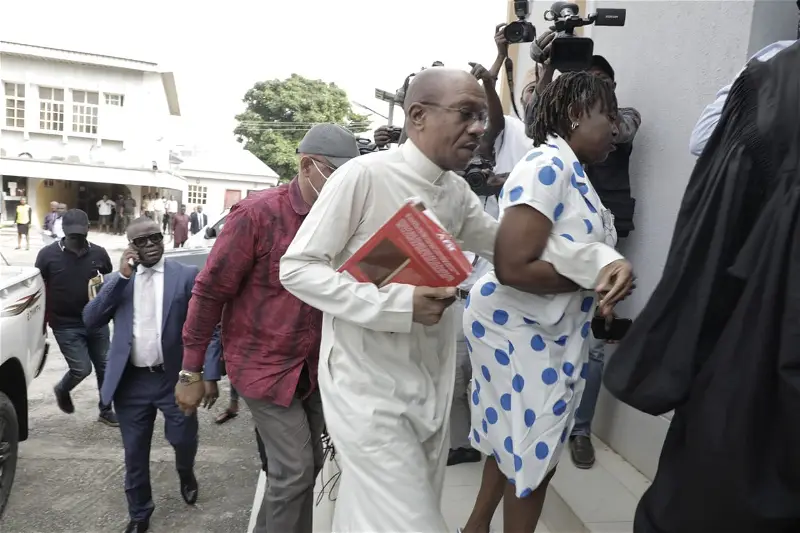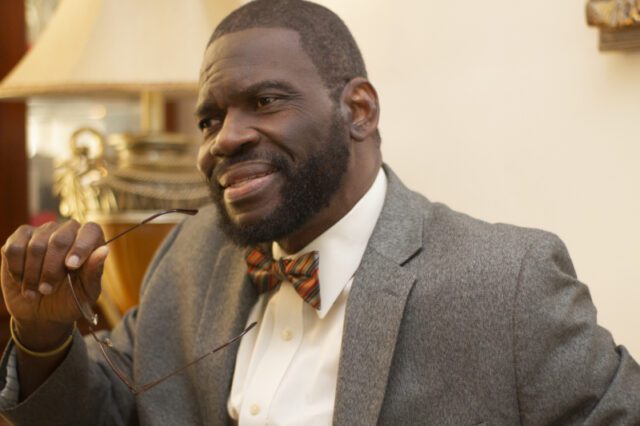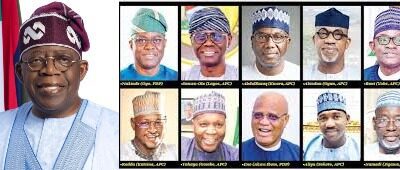National Issues
Examining Godwin Emefiele’s Journey from Arrogance to Legal Troubles — A Cautionary Tale of Elite Hubris in Nigeria -By John Egbeazien Oshodi
The call to avoid profound abuse of power is resonant, reflecting the collective desire for ethical governance and responsible leadership. In Nigeria, leaders are seen as custodians of societal values, entrusted with the responsibility to safeguard the nation’s cultural identity. Any deviation from ethical conduct is not only a breach of legal principles but also a betrayal of the cultural ethos that underpins the nation’s unity.

In May 2022, Godwin Emefiele, the former Governor of the Central Bank of Nigeria, made dismissive remarks when confronted about his dual roles and rumored presidential aspirations, stating, “Let them have a heart attack. It’s good to have a heart attack.” Little did he anticipate that these words would become symbolic of a tumultuous journey in the following months.
Fast forward to June 2023, Emefiele found himself in the custody of the Department of State Services (DSS) for an extended period. Recently, the Economic and Financial Crimes Commission (EFCC) kept him in detention. Now the former Governor of the Central Bank of Nigeria, Mr. Godwin Emefiele, has been granted bail by the Abuja High Court at Maitama.
In delving deeper into the narrative surrounding Godwin Emefiele, the former Governor of the Central Bank of Nigeria, we uncover broader implications regarding the misuse of power by Nigeria’s elite class. Emefiele’s journey, marked by dismissive statements, legal troubles, and the erosion of public trust, serves as a stark cautionary tale about the pitfalls of elite hubris.
The episode, beginning with Emefiele’s nonchalant response to concerns about his simultaneous roles and rumored political ambitions, reflects a prevailing attitude among some members of the Nigerian elite. The notion of “Who I be” — an expression of perceived invincibility or immunity from accountability — has, at times, been wielded recklessly by those in positions of power.
In the Nigerian context, the misuse of power by elites is not an isolated incident. The public has witnessed instances where influential figures, feeling shielded by their positions, engage in behaviors that undermine accountability, transparency, and the rule of law. This misuse of power often manifests in a disconnect between the elite and the ordinary citizens, eroding the social contract that underpins effective governance.
Emefiele’s legal troubles, from detention by the Department of State Services (DSS) to the ongoing investigation by the Economic and Financial Crimes Commission (EFCC), serve as a manifestation of the consequences that can befall those who act with impunity. The legal processes underscore the need for accountability, irrespective of one’s position or influence.
Given the prolonged duration of Godwin Emefiele’s detention since June 2023, it’s important to note that his case seemingly warranted consideration for bail long ago. Rather than being confined to a police cell, similar to the situations at the DSS or EFCC, he might have been held in a correctional facility. These circumstances could have subjected him to considerable stressors.
Advocating for a comprehensive physical and psychological checkup is a compassionate approach, irrespective of past actions or statements. The stress and uncertainties associated with legal issues and confinement can profoundly impact an individual’s well-being.
This suggestion aligns with fundamental principles of fairness, justice, and basic human rights. Stressing the necessity for a thorough examination, both physically and psychologically, underscores the importance of treating individuals with dignity and ensuring their well-being during legal processes.
Emefiele’s prior statement, ironically wishing heart attacks on others, now adds a layer of complexity to his own situation. It serves as a reminder of the importance of empathy and understanding, recognizing that circumstances can change, and individuals may find themselves in unexpected and challenging situations.
In a broader context, this situation prompts reflection on the profound impact of words and actions, highlighting the need for empathy, humility, and an acknowledgment of our shared humanity when dealing with complex and sensitive matters. As this narrative unfolds, it provides an opportunity for a more extensive societal conversation about fostering a leadership culture that prioritizes accountability, transparency, and, above all, a genuine connection with the citizens whom leaders are meant to serve.
This case should serve as a lesson for other influential figures within the Nigerian power structure. It underscores the vital importance of leaders recognizing the fragility of public trust and the risks associated with underestimating the sentiments of the citizens they serve. Emefiele’s journey, from dismissive remarks to legal troubles, serves as a cautionary tale about the repercussions of arrogance in positions of influence.
The reminder that no one is above accountability strikes a chord in a society where notions of justice and fairness are deeply embedded. Nigeria has a history of diverse leadership styles, and the expectations of the citizenry are rooted in a desire for transparent and accountable governance.
Leadership in Nigeria is not merely a political or administrative role; it carries a moral responsibility deeply connected to cultural values. It is contingent upon leaders upholding the principles of justice, fairness, and integrity. Leaders are expected to navigate the complexities of power with humility, recognizing the interconnectedness of their actions with the well-being of the larger society.
The ongoing developments in the case of Godwin Emefiele provide a sobering reflection on the delicate balance between power and the expectations of the citizenry. In a nation where the influence of prominent figures reverberates across society, the accountability of leaders is not only a legal matter but also a matter of cultural significance.
This holds even greater importance in the context of Nigeria’s diverse cultural landscape, where respect for authority and communal well-being are deeply ingrained. The unfolding events surrounding Emefiele underscore the intricate interplay between power dynamics and societal expectations. It is a stark reminder that leaders, irrespective of their positions, are not only accountable within the confines of legal frameworks but are also subject to the collective scrutiny of a culture that values justice, fairness, and ethical conduct.
The call to avoid profound abuse of power is resonant, reflecting the collective desire for ethical governance and responsible leadership. In Nigeria, leaders are seen as custodians of societal values, entrusted with the responsibility to safeguard the nation’s cultural identity. Any deviation from ethical conduct is not only a breach of legal principles but also a betrayal of the cultural ethos that underpins the nation’s unity.
Avoiding profound abuse of power becomes not only a legal imperative but also a cultural necessity. It speaks to the preservation of Nigeria’s unique identity and the shared values that bind its diverse communities together. Leaders, whether in political, economic, or social spheres, are called upon to foster an environment where justice prevails, opportunities are equitably distributed, and the welfare of the people takes precedence over personal or vested interests.
As the narrative surrounding Emefiele unfolds, it serves as a cultural touchstone, prompting a broader conversation about the kind of leadership that aligns with the aspirations of the Nigerian people. The imperative to avoid profound abuse of power becomes central to this dialogue, emphasizing the need for sustainable systems built on accountability, transparency, and the conscientious exercise of authority. In navigating the path forward, Nigeria’s leaders are tasked not only with upholding legal standards but also with embodying the cultural values that define the nation’s character.
Nigeria’s citizens, known for their resilience and collective spirit, actively engage in shaping the destiny of the nation.
The expectations for transparent and accountable leadership align with the communal ethos that values the greater good over individual interests. The cautionary tale of Emefiele reinforces the idea that leaders, regardless of their status, must be attuned to the pulse of the people and navigate their responsibilities with a sense of humility and service.
As the narrative continues to unfold, it serves as a catalyst for broader societal conversations about governance, ethical leadership, and the cultural expectations placed on those in positions of authority. In a nation as diverse and dynamic as Nigeria, this cautionary tale becomes not just a reflection on an individual’s journey but a collective mirror through which society examines its values and aspirations for a more accountable and transparent future.

John Egbeazien Oshodi
Professor John Egbeazien Oshodi, who was born in Uromi, Edo State, Nigeria, to a father who served in the Nigeria police for 37 years, is an American-based police and prison scientist and forensic, clinical, and legal psychologist. A government consultant on matters of forensic-clinical psychological services in the USA; and a former interim associate dean and assistant professor at Broward College, Florida. The Founder of the Dr. John Egbeazien Oshodi Foundation, Center for Psychological Health and Behavioral Change in African Settings. In 2011, he introduced state-of-the-art forensic psychology into Nigeria through N.U.C. and Nasarawa State University, where he served in the Department of Psychology as an Associate Professor. He has taught at various universities and colleges including Florida memorial University, Florida International University, Broward college, Lynn University, and a contributing faculty member at the Weldios university in Benin Republic, Nexus International University, Uganda, Nova Southeastern University and Walden University in USA. He is a Human Rights Psychologist with a focus on African related environments. john.oshodi@mail.waldenu.edu

















